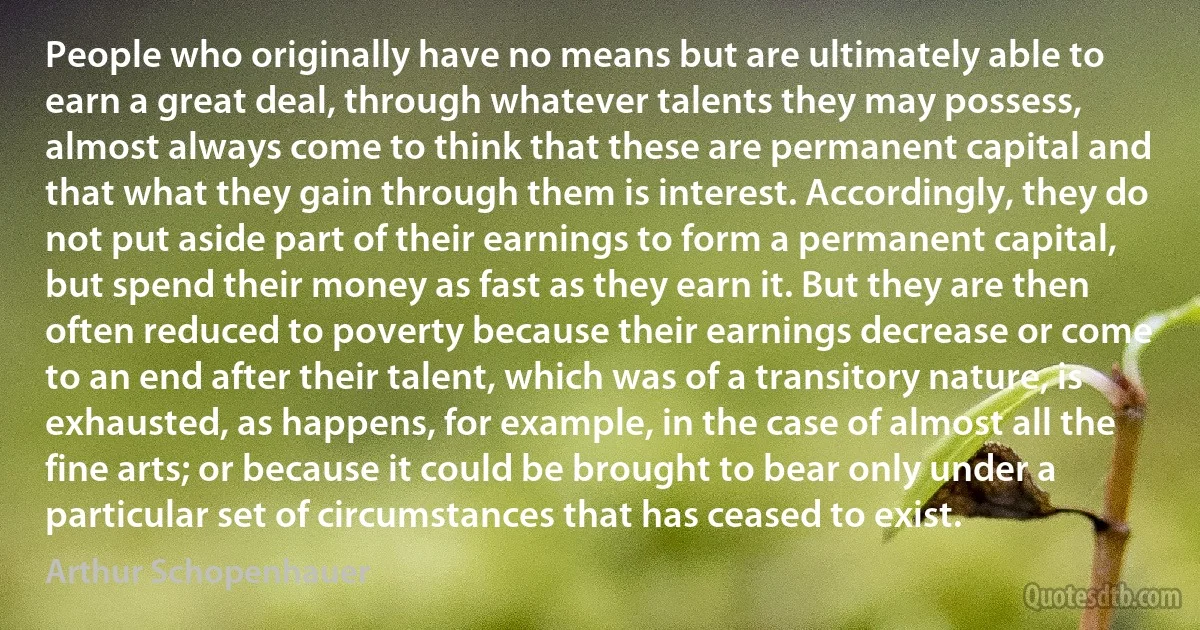
People who originally have no means but are ultimately able to earn a great deal, through whatever talents they may possess, almost always come to think that these are permanent capital and that what they gain through them is interest. Accordingly, they do not put aside part of their earnings to form a permanent capital, but spend their money as fast as they earn it. But they are then often reduced to poverty because their earnings decrease or come to an end after their talent, which was of a transitory nature, is exhausted, as happens, for example, in the case of almost all the fine arts; or because it could be brought to bear only under a particular set of circumstances that has ceased to exist.
Arthur SchopenhauerRelated topics
able almost aside bear case deal earn end example fast fine form gain great interest money nature people poverty set spend talent think under whatever means circumstancesRelated quotes
In the case of a novel, or any imaginative work, especially if the tone is poetic, my own preference is for ending with a touch of symbolism which shall leave the reader brooding. A fine novel, a well-written story, "proves" nothing. Certain characters have played their parts, life goes on, and the final passage may be allowed to remain with one foot in the air, as is the case with some of Chopin's conclusions. But there is no absolute rule in such matters, and there are epic novelists who like to end on a powerful crescendo, as Ravel does in Bolero, or Dvorak in the New-World Symphony. Composition has features which are common to all the arts, and the author can learn as much about his business in the concert hall as in the library.

André Maurois
Immobile, certain, and permanent things, ideas, works and beliefs change, transform, and disintegrate...Movement is the only static, final, permanent, and certain thing. Static means transformation...Do not hold on to anything...Do not pinpoint anything!... We are fooling ourselves if we close our eyes and refuse to recognize the change... Decomposition begins only when we try to prevent it... We would so much like to own, think, or be something static, eternal, and permanent. However, our only eternal possession will be change... To attempt to hold fast an instant is doubtful... How beautiful it is to be transitory. How lovely it is not to have to live forever.

Jean Tinguely
The atmosphere in [the last twenty] years has been, in many parts of the country, poisoned. I do not wish to say anything here about where the faults may lie. But I do want to say that I realise, as you do, that a great deal of the propaganda which has been done during the last twenty years-the propaganda of a kind that teaches class hatred-has in many places done its evil and its poisonous work...the work that has been done in that direction cannot be undone in a moment. And it will mean the utmost goodwill, the utmost force of example to bring about, to any great extent, something better and something on which we may erect a permanent and stable building.

Stanley Baldwin
When the time-table is so arranged as to call for speed nearly equal to the full capacity of the engine, it is very obvious that the risks of failure in making time, must be much greater than at reduced rates, and when they do occur, the efforts made to gain time must be correspondingly greater and uncertain. A train whose prescribed rate of speed is thirty miles per hour, having lost five minutes of time, and being required to gain it, in order to meet and pass an opposing train at a station ten miles distant, must necessarily increase its speed to forty miles an hour; and a train whose rate of speed is 40 miles per hour, under similar circumstances, must increase its speed to 60 miles per hour.

Daniel McCallum
At many stages in the advance of humanity, this conflict between the men who possess more than they have earned and the men who have earned more than they possess is the central condition of progress. In our day it appears as the struggle of freemen to gain and hold the right of self-government as against the special interests, who twist the methods of free government into machinery for defeating the popular will. At every stage, and under all circumstances, the essence of the struggle is to equalize opportunity, destroy privilege, and give to the life and citizenship of every individual the highest possible value both to himself and to the commonwealth.

Theodore Roosevelt
